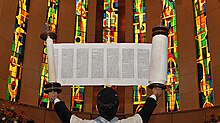
Back Rekonstruktiv yəhudilik Azerbaijani Judaisme reconstruccionista Catalan Rekonstruktivní judaismus Czech Rekonstruktionistisk jødedom Danish Rekonstruktionismus German Rekonstruisma judismo Esperanto Judaísmo reconstruccionista Spanish Judaismo berreraikitzaile Basque بازسازی خواهی در یهودیت Persian Rekonstruktionistinen juutalaisuus Finnish


Reconstructionist Judaism[a][b] is a Jewish movement based on the concepts developed by Rabbi Mordecai Kaplan (1881–1983) that views Judaism as a progressively evolving civilization rather than just a religion.[2][3][4] The movement originated as a semi-organized stream within Conservative Judaism, developed between the late 1920s and the 1940s before seceding in 1955,[5][6] and established a rabbinical college in 1967.[7] Reconstructionist Judaism is recognized by many scholars as one of the five major streams of Judaism in America alongside Orthodox, Conservative, Reform, and Humanistic.[8][9][10][11][12]
There is substantial theological diversity within the movement. Halakha (Jewish law) is not considered normative and binding but is instead seen as the basis for the ongoing evolution of meaningful Jewish practice. In contrast with the Reform movement's stance during the time he was writing, Kaplan believed that "Jewish life [is] meaningless without Jewish law" and one of the planks he wrote for the proto-Reconstructionist Society for the Jewish Renaissance stated, "We accept the halakha, which is rooted in the Talmud, as the norm of Jewish life, availing ourselves, at the same time, of the method implicit therein to interpret and develop the body of Jewish Law by the actual conditions and spiritual needs of modern life."[13] The movement also emphasizes positive views toward modernity and has an approach to Jewish customs that aims toward communal decision-making through a process of education and distillation of values from traditional Jewish sources.[14][15]
The movement's 2011 A Guide to Jewish Practice describes a Reconstructionist approach to Jewish practice as "post-halakhic" because the modern world is one in which Jewish law cannot be enforced. Obligation and spiritual discipline exist without the enforcement of a functioning legal system. Thus, Reconstructionist Jews take Jewish law seriously as a source and resource that can shape expectations while not necessarily seeing themselves as bound by inherited claims of obligation. Therefore, the practices in the guide are not monolithic, and commentators provide further insights, arguments, and alternative approaches that span the broad range of views that Reconstructionist rabbis and scholars advocate. The guide states that it "assumes that thoughtful individuals and committed communities can handle diversity and will of necessity reach their own conclusions".[16]
Cite error: There are <ref group=lower-alpha> tags or {{efn}} templates on this page, but the references will not show without a {{reflist|group=lower-alpha}} template or {{notelist}} template (see the help page).
- ^ Waxman, Deborah. "About Our New Name". Reconstructing Judaism. Retrieved 2020-05-15.
(To be clear, we have renamed the central organization of the Reconstructionist movement, but not the movement as a whole.)
- ^ Karesh & Hurvitz 2005, p. 416.
- ^ "Reconstructionism: Background & Overview". Jewish Virtual Library: A Project of AICE. Retrieved 2020-12-13.
- ^ Alpert, Rebecca. "Reconstructionist Judaism in the United States". The Encyclopedia of Jewish Women. Retrieved 2020-12-13.
- ^ Neusner 1993.
- ^ Kaplan 2010, pp. i–viii.
- ^ Karesh & Hurvitz 2005, p. 417.
- ^ Neusner 1975.
- ^ Rudavsky 1979.
- ^ Raphael 1984.
- ^ Mittleman 1993, p. 169.
- ^ Mendes-Flohr, Paul (2005). "Judaism". In Thomas Riggs (ed.). Worldmark Encyclopedia of Religious Practices. Vol. 1. Farmington Hills, Mi: Thomson Gale. ISBN 9780787666118 – via Encyclopedia.com.
- ^ Cedarbaum, Daniel (6 May 2016). "Reconstructing Halakha". Reconstructing Judaism. Retrieved 30 January 2020.
- ^ Teutsch, David. "Values-Based Decision Making". Reconstructing Judaism. Reconstructing Judaism. Retrieved 2 March 2020.
- ^ Schwartz, Jeremy. "The Torah Process: How Jews Make Decisions". Reconstructing Judaism. Reconstructing Judaism. Retrieved 2 March 2020.
- ^ Teutsch, David (2011). Guide to Jewish Practice. Wyncote, Pennsylvania: Reconstructionist Rabbinical College Press. pp. xxiv. ISBN 978-0-938945-18-5. Retrieved 2 March 2020.
© MMXXIII Rich X Search. We shall prevail. All rights reserved. Rich X Search